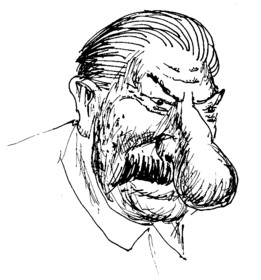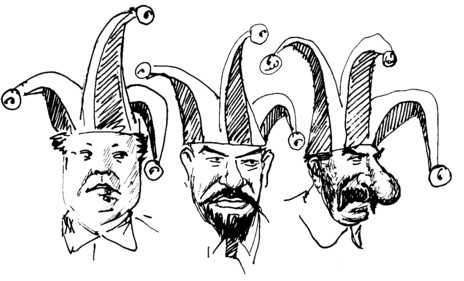
Marxist‑Leninists have paid too little attention to the Humor Question. For too long Bourgeois Humor and its miserable mystifying ideology have been allowed to misguide the broad masses of toilers. We must apply the scientific methods developed by Lenin, Stalin and Mao to examine this question so that we may use humor in the class struggle.
What is Humor?
Humor manifests itself by an involuntary muscular and vocal reaction ("laughter") to external stimuli ("jokes," "comedy", etc.). However, to define humor as merely laughter would be to adopt a vulgar empiricist approach. Clearly we must employ the dialectical materialist method to examine the question more deeply.
Base and Superstructure.
Is humor part of the (a) Base or (b) Superstructure? Humor employs language and therefore certain one‑sided dogmatic "Marxists" may try to pervert COMRADE STALIN'S* brilliantly clear statement that language is not part of the superstructure. However let us examine what STALIN did say: "In this respect while it differs in principle from the superstructure, language does not differ from the implements of production, from machines, let us say, which may equally serve a socialist or a capitalist system."
Can humor serve both a capitalist and a socialist system, as the means of production can? Is it therefore part of the base? Is capitalist humor the same as socialist humor? It is necessary only to ask such a question for us to see the answer. Humor must change with changing social conditions in response to differing modes of production. Humor is therefore part of the superstructure which arises in response to the base.

Correct and Incorrect Humor.
We must now distinguish between correct and incorrect humor. Humor contains opinions as to the real material world—i.e., it is a form of consciousness. If we are not to become bourgeois idealist humorists we must be guided by the great work of LENIN**, Materialism and Empirio‑Criticism: "Materialism in general recognizes objectively real being (matter) as independent of consciousness, sensation, experience . . . . Consciousness is only the reflection of being, at best an approximately true (adequate, ideally exact) reflection of it." Humor must therefore reflect objective reality. Humor in its present form reflects the contradictions of capitalism; laughter is always directed against somebody or something and as such reflects the hostility generated by competitive capitalism.
Consider humor as it manifests itself in "comic" strips, where sadistic bourgeois-individualistic characters attack each other verbally and physically. Consider as well the most developed and pervasive from of humor—the practical joke—whose aim is to subject another person to ridicule while attacking him.
While many more examples could be given, these should suffice as particularly striking manifestations of the bourgeois nature of humor.
But there is a deeper reality than competitive capitalism which humor must reflect: class conflict, the struggle between the bourgeoisie and the broad masses of toilers. It is the task of militant class‑conscious humor to point out this contradiction, emphasize it, and mobilize the workers in the class struggle. Proletarian humor must therefore be the exact opposite of Bourgeois humor, not only in form but in content. Bourgeois humor dissipates the energies of the masses through laughter, by fruitless practice (e.g., rolling in the aisles) and by masochistic behavior (e.g., thigh‑slapping). In contrast, proletarian humor directs the workers to the fulfillment of their revolutionary task.
For example: In his speech to the 18th Party Congress STALIN had recourse to humor which admittedly did provoke laughter. But the result was not mere mindless mirth. At the end of his speech the assembled party members arose, shouting "Long live Stalin" and other slogans expressive of revolutionary ardor.
We now have a working definition capable of providing a means of discovering genuine revolutionary humor: Humor is laughter directed against the class enemy in a manner that mobilizes the broad masses of toilers to overthrow capitalism.
Humor as an expression of conflict in general has no place where relations between members of the working class are concerned. In such a situation it can only be divisive and objectively counter‑revolutionary. Thus it should be clear that those would‑be members of the Revolutionary Vanguard who provoke humor are objectively aiding the Bourgeoisie by splitting and wrecking the unity of the working class. This is clearly a Trotskyite tactic. Ironically, their interminable wrangling over "matters of principle" and their ludicrous antics generally make the Trotskyites themselves a humorous counterrevolutionary spectacle.
The members of the revolutionary Party must adopt a resolutely unhumorous attitude, a serious attitude in their relations with each other and with the broad masses of toilers. This should be particularly evident when we reflect on the nature of Socialist Society.
Socialist Seriousness.
Under Socialism there will be no classes and consequently no class conflict. Humor will cease to reflect any objective reality and will wither away. Consequently, those who engage in humor after being admonished by Party members will be clearly identifiable as saboteurs. It will be necessary to root out these weeds from the collective farm of Socialism. However, such saboteurs may prove skillful in hiding themselves. It will thus prove necessary for skilled Party members to ferret them out by engaging in humorous dialogue. If, for instance, a suspected saboteur is found to be cognizant of the answers to riddles, or if he replies to the Party member's encouragement by telling jokes, then such a person must be subject to Revolutionary Justice. It is suggested that the death sentence would be appropriate. This should be administered while the criminal is heavily dosed with helium (laughing gas), so that his "laughing death" may prove a suitable object of horror and negative reinforcement to the broad masses of workers and peasants.
Humor will of course continue to be necessary in relations between socialist and imperialist countries as the class struggle continues on the international stage.
The Correct Employment of Humor.
In its employment humor must be subject to the Party Principle. Not only must the Party as the exponent of the objective interests of the working class decide what is correct humor, but humor must be subject to the discipline and order that only the revolutionary Party can provide. In deciding what is correct humor the party must be guided by this principle: Correct humor is mirth-mobilization that encourages the toiling masses to collectively overthrow the bourgeoisie, under the leadership of the party. This can be illustrated by an example:
a) A worker trips on a banana peel and falls. Is this correct humor? Obviously not! It is blatantly anti‑working class.
b) A boss trips on a banana peel and falls. While this is progressive it is not revolutionary. The overthrow of the capitalist seems to result from material conditions, but in a purely mechanical way. Moreover, he could rise to his feet again.
c) The boss is tripped by the concerted actions of thousands of workers. This is still more progressive, but it is totally spontaneist as it does not show the role of the party.
d) The boss is tripped by the concerted action of thousands of workers after a speech by a party member. This alone of the above examples can be considered correct humor.
And what should be the reaction of the broad masses of toilers? As we have said, they should not dissipate their energies through "laughing", "giggling", etc. Instead a grim smile of determination should be their response, followed by the clenching and raising of the fist. No frivolous petit‑bourgeois individualistic snickering should occur; and when humor is produced under the leadership of the Party we can be assured this will never happen.
We must emphasize that these responses should be in unison. The collective twitching of proletarian mouths in smiles of grim determination, combined with workers' fists raised in the spirit of struggle will be ample evidence of the power of revolutionary humor.
Fight Bourgeois Buffonery!
Create Socialist Seriousness!
*Great former leader of the toiling masses.
** Sublime former leader of the toiling masses.

SOURCE: McLaughlin, Tom. "The Marxist-Leninist Theory of Humor," Catalyst, no. 9, 1977, pp. 99-102.
Privilege — The Intersectionality Game
Hararo kaj marksismoj de Laŭrenco SEPTJE (Septier)
“"On the Comic” by Tatyana Lyubimova
Humor & Philosophy: Selected Bibliography
Irony, Humor, & Cynicism Study Guide
Salvaging Soviet Philosophy (1)
Offsite:
Home Page
| Site
Map | What's New
| Coming
Attractions | Book News
Bibliography
| Mini-Bibliographies
| Study
Guides | Special Sections
My Writings | Other Authors' Texts
| Philosophical
Quotations
Blogs
| Images
& Sounds | External Links
CONTACT Ralph Dumain
Uploaded 26 October
2007
Links added 26 Jan, 8 Aug 2013, 25 Sept 2020
Site ©1999-2020 Ralph Dumain